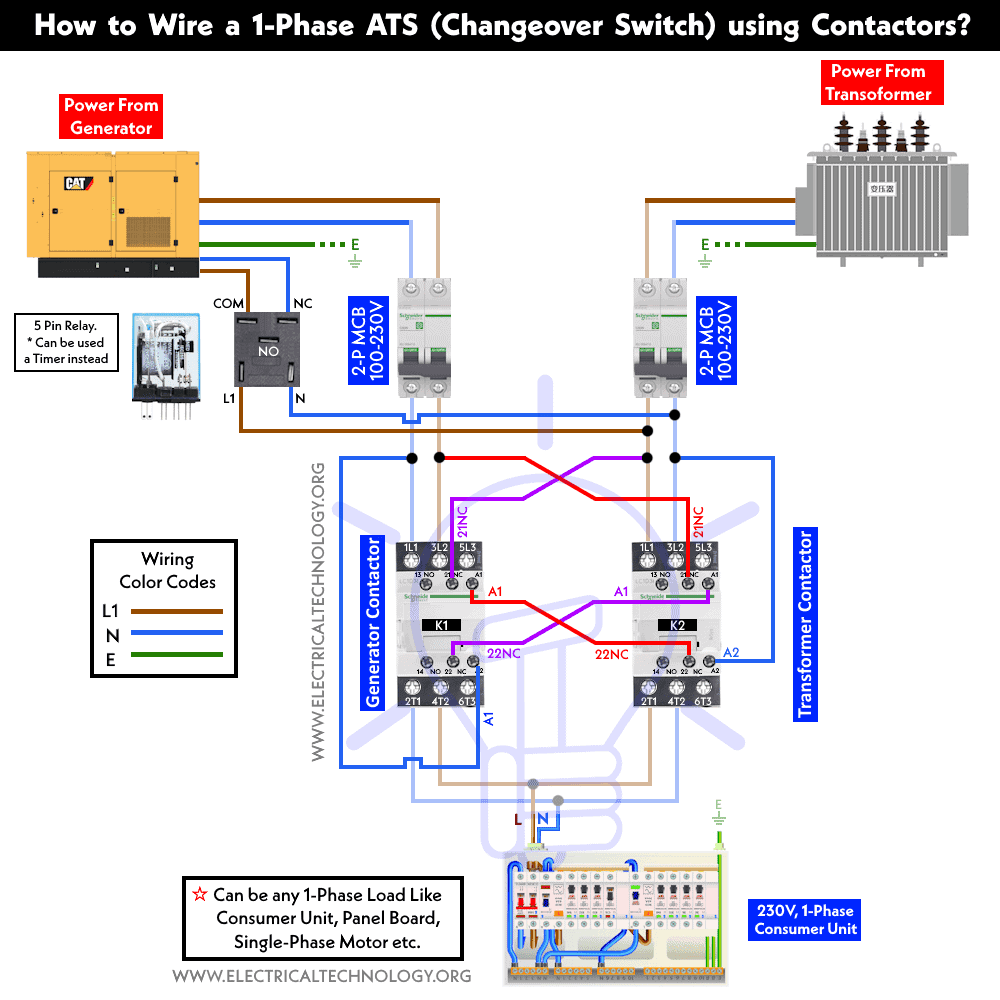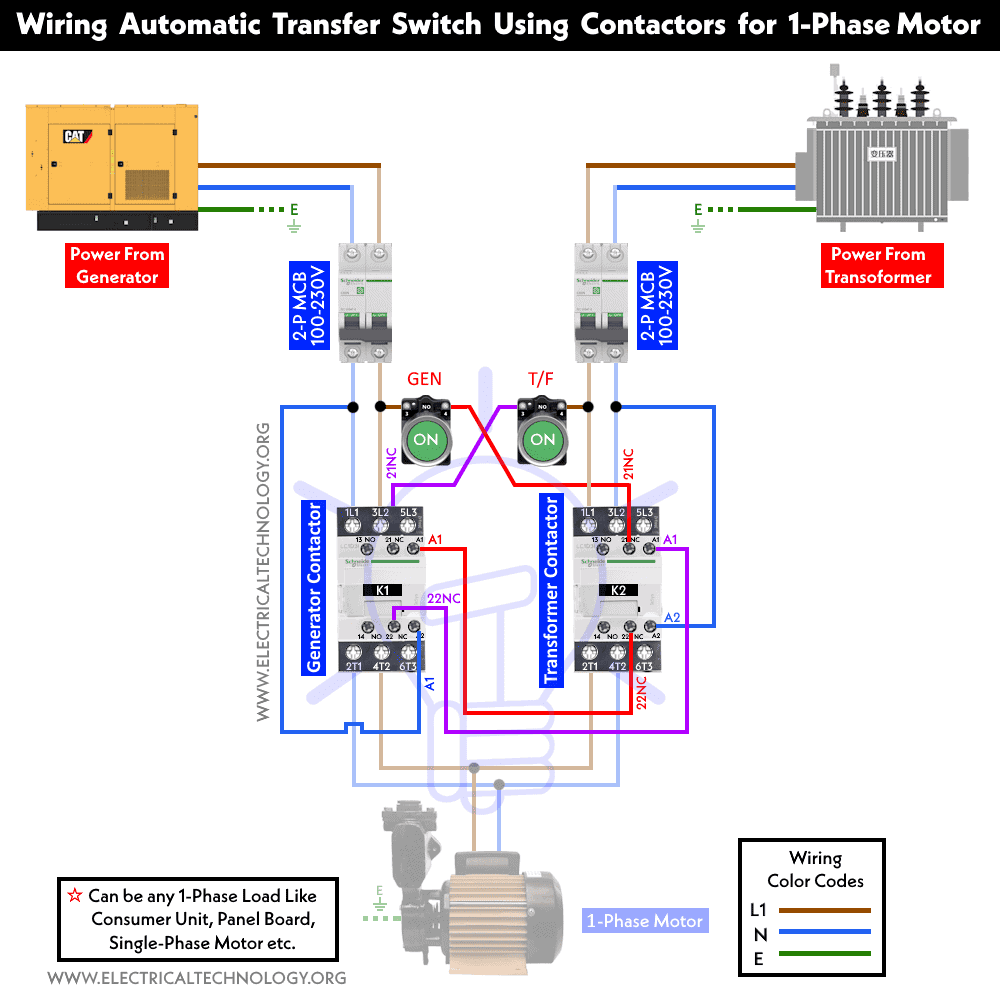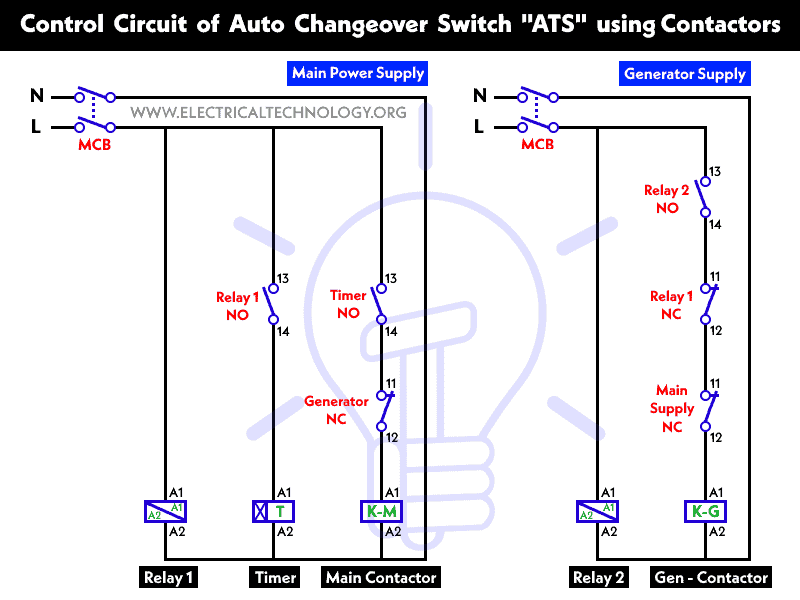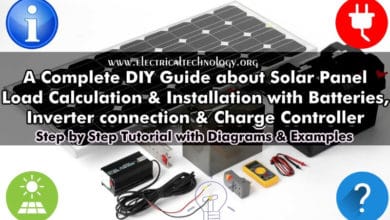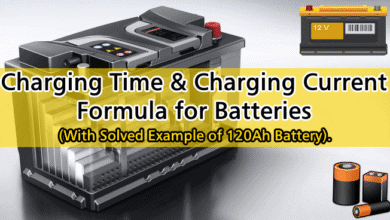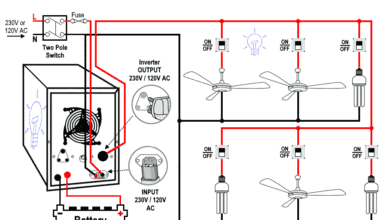1-Phase Automatic Changeover (ATS) using Contactors and Timer
How to Wire an Automatic Changeover Switch (ATS) using Contactors and Timer for Single-Phase Load?
An Automatic Transfer Switch (ATS) is a critical component in ensuring uninterrupted power supply in various applications. It is particularly essential in scenarios where a backup power source, such as a generator, needs to seamlessly take over in the event of a primary power failure. In this tutorial, we will show how to wire an automatic changeover switch (ATS) using contactors, timers, relays and circuit breakers for single-phase loads with the help of power and control diagrams.
In many residential, commercial, and industrial applications, a single-phase electrical system is commonly used to power a wide range of equipment and appliances. However, power interruptions can lead to downtime, damage to sensitive devices, and inconvenience.
An ATS is the solution to this problem, as it can automatically switch the load from the main power supply to an alternate source like a generator when a power outage occurs, ensuring a seamless transition.
Components Needed
To wire an ATS (automatic transfer switch) using contactors and a timer for a single-phase load, you will need the following components and devices:
- 2 Nos. of Contactors
- 2 Nos. of 14-Pin or 1 No of 5-Pin Relay
- Timer
- 4 Nos. of 2P-MCB
- 1 NO ON/OFF Switch
- 1-Phase Main and Backup Power Supply
- Wires & Cables
- Single Phase Load (Consumer unit, main panel or single-phase motor etc.)
Wiring, Power and Control Circuit Diagrams
Wiring & Control for 1-Phase Distribution Board
ATS using Contactor, Timer and 14-Pin Relay
Click image (or open in new tab) to enlarge
ATS using Contactor, Timer and 5-Pin Relay
Click image (or open in new tab) to enlarge
Wiring & Control for 1-Phase Motor
Control Circuit Diagram
Step by Step Wiring Guide
Now, let’s do the wiring process for an ATS with contactors and a timer for a single-phase load as follow:
- Make sure the main and backup power supplies are switched off before working on any circuit. Wear the appropriate protective gear and use insulated tools for proper protection.
- Calculate the total load and select right sized circuit breakers contactors, timer and relays that are appropriately sized for the required load.
- Install the ATS panel box in a safe and accessible location following by to the local area codes.
- Wire and connect the main power supply from the transformer and utility pole and the backup power supply (e.g. generator) respectively to the related circuit breakers. Now wire both 14-pin relay (or 5-Pin relay) as well as the timer as shown in the control and power wiring diagrams. Ensure proper grounding and secure connections.
- Connect the single-phase load to the output terminals of the ATS (like consumer unit, main panel or single phase induction motor etc.).
- Inside the control panel, wire the contactors, timer, relay and any other control devices according to the system’s schematic diagram (as shown above) and the manufacturer’s instructions. Use suitable wire sizes and insulate all connections properly.
- Program the timer or relay to meet your specific requirements. Set delays and transition times as needed to ensure a smooth transfer between power sources.
- After completing the wiring and programming, perform thorough testing. Simulate power outages and ensure that the ATS operates as intended. Verify that the load transfers seamlessly between the primary and backup power sources.
- To ensure reliable operation, conduct regular maintenance checks on all components, including contactors, timers, and power sources. Replace any faulty components promptly.
- If not sure, consult with a qualified electrician or engineer when setting up such systems to guarantee their safety and effectiveness for your specific application.
Operation of the 1-Phase Automatic Changeover using Contactors:
Suppose both circuit breakers are switched OFF; hence, the single-phase load (e.g., a motor, consumer unit, main panel, etc.) is also OFF.
When the breaker for the main power supply is switched ON, the load won’t activate immediately but will do so a few seconds later due to the delay timer setting.
In the event of a main power supply failure, the connected load circuit will automatically transfer to the backup power source (e.g., a generator, solar panel, battery, etc.), providing seamless and uninterrupted power supply.
When the main power supply is restored, the circuit will switch the power supply from the generator to the main power supply but will activate the circuit after a few seconds due to the timer setting.
Keep in mind that both contactors will not operate at a time due to electrical interlocking between the main contactor and the generator contactor. This action by automatic changeover using contactors will prevent the damage to the circuit and connected appliances.
Related Posts:
- How to Wire Auto & Manual Changeover & Transfer Switch (1 & 3 Phase)
- Manual & Auto UPS / Inverter Wiring Diagram with Changeover Switch
- How to Connect a Portable Generator to the Home Supply – 4 Methods
- Single Phase Electrical Wiring Installation in Home – NEC & IEC
- Three Phase Electrical Wiring Installation in Home – NEC & IEC
- How to Wire 120V & 240V Main Panel? Breaker Box Installation
- How to Wire 208V & 120V, 1-Phase & 3-Phase Main Panel?
- How to Wire Single-Phase, 230V Consumer Unit with RCD? IEC, UK & EU
- How to Wire a Garage Consumer Unit?
- How To Wire a Single Phase Energy meter? IEC & NEC
- How To Wire a 3 Phase kWh meter? IEC and NEC
- How to Wire Solar Panel to 120-230V AC Load and Inverter?
- Automatic Phase Reverse Protection Using Contactors & Relay
- Even More Residential Wiring Installation Tutorials

